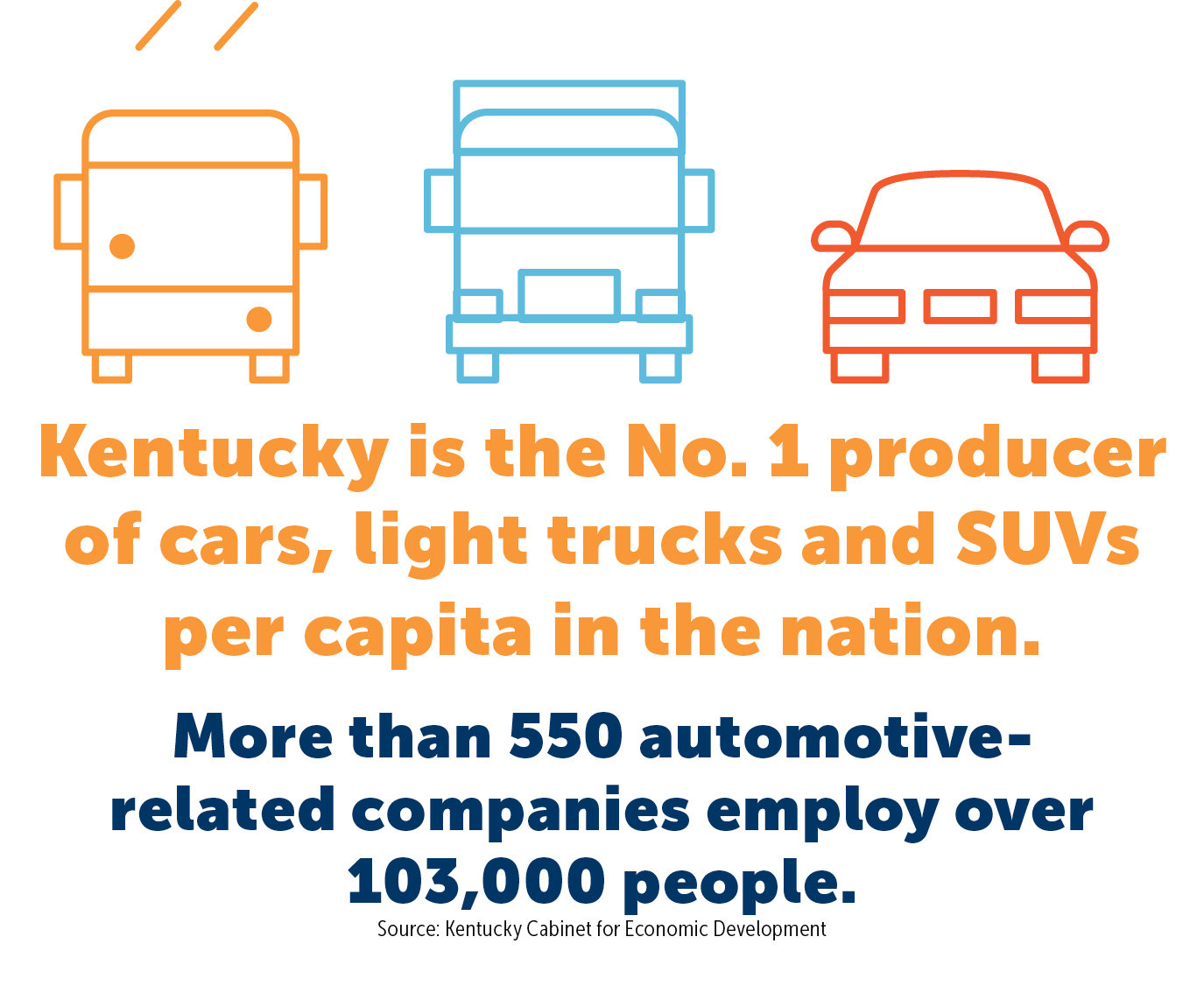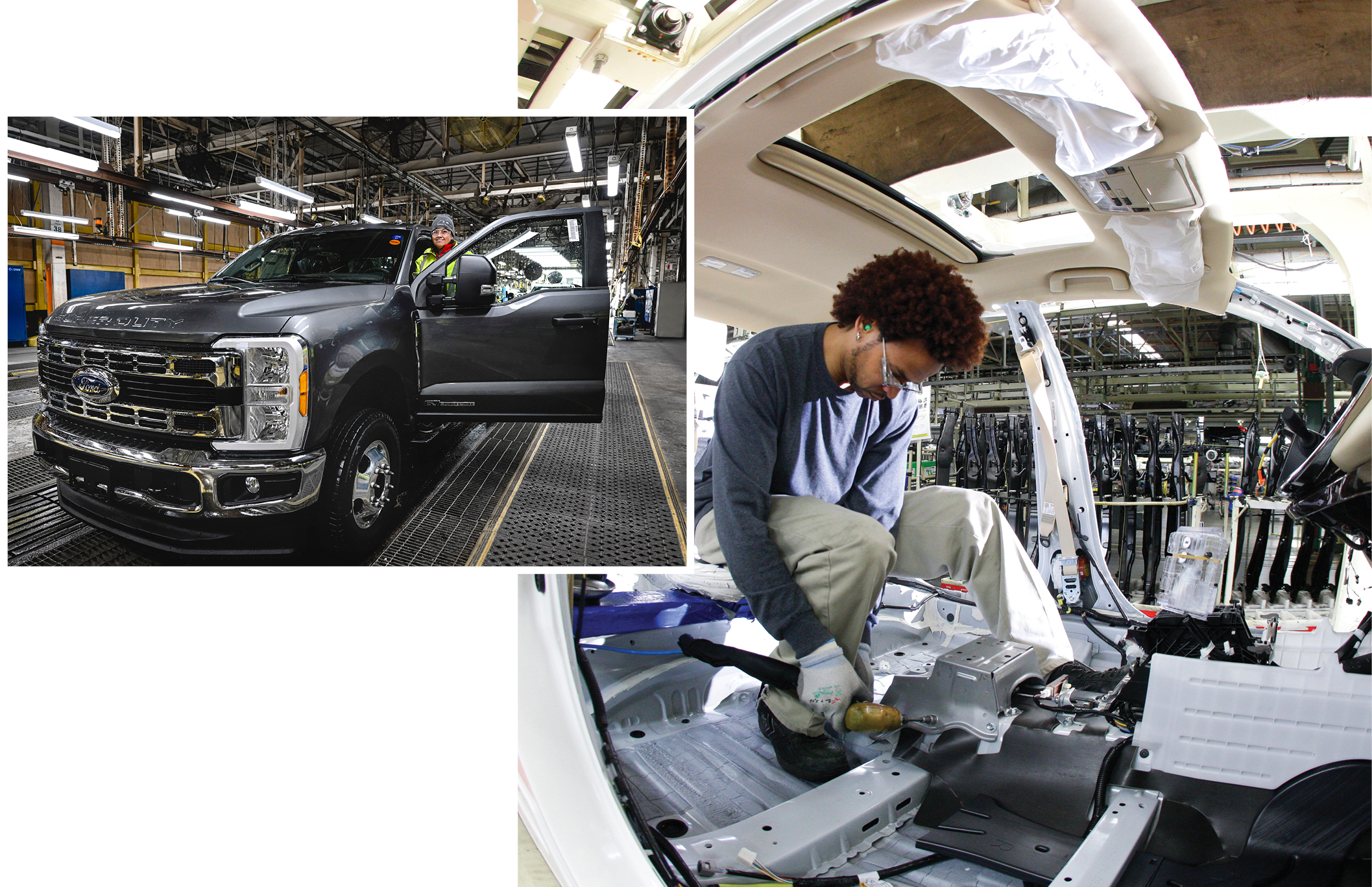The internal combustion and electric vehicle sectors are both growing at an incredible rate in Kentucky. Sometimes in the same place.
Take Toyota, whose plant in Georgetown rolled out its first Camry in 1988 and has produced more than 13 million vehicles since. In February 2024 the company announced it would invest $1.3 billion at the facility “for future electrification efforts including assembly of an all-new, three row battery electric SUV for the U.S. market.” The project brings the plant’s total investment to nearly $10 billion and also brings battery pack assembly to the site, with batteries being supplied by the company’s new Toyota Battery Manufacturing North Carolina site.
“Today’s announcement reflects our commitment to vehicle electrification and further reinvesting in our U.S. operations,” said Kerry Creech, president of Toyota Kentucky, on February 6.
Since 2021, Toyota has announced new investments totaling $17 billion into its U.S. manufacturing operations to support electrification efforts.
“Every investment Toyota makes is proof of its commitment to employees,” said Chris Cohelia, group leader at Toyota Kentucky. “I joined this company 26 years ago as a production team member. Job stability, competitive pay and opportunities for growth are all reasons I love working here. It’s also exciting to be a part of the team building Toyota’s first battery electric vehicle in North America.”
In 2023, Kentucky saw nearly $1.8 billion in automotive-related investments, with more than 2,500 full-time jobs announced by companies within the sector. Since 2020, Kentucky’s EV sector has welcomed nearly $11 billion in investment and over 10,000 full-time jobs, including a transformative $5.8 billion investment announced in 2021 that will create 5,000 jobs in Hardin County from Ford Motor Co. and SK On. The two largest economic development projects in state history – which includes a $2 billion, 2,000-job commitment from AESC in Warren County— are EV-related and together have established Kentucky as a leader in future EV battery production in the United States.
Dennis Cuneo, currently a partner at Fisher & Phillips LLP, is the former senior vice president of Toyota Motor North America, and has helped the company build out its North American site portfolio. Back in 2004, he described assembly plans as “the single largest economic engine you can think of.”
The BlueOval SK site in Glendale is on a parcel that Cuneo and his team looked at 20 years ago.
“The states that can develop these megasites have a big advantage,” he said, not least because of the driving force of federal incentives related to the Inflation Reduction Act, which is compressing timelines and ROI.
“Think about it,” Cuneo said. “Twenty years ago, if you had [heard news of] an assembly plant every six months it was a big deal. Over the past year, it’s every two weeks. It’s really incredible, a huge change.”
A True Partner in Team Kentucky
One of the key automotive issues across the nation is provision of power, as even the largest of utilities are being pressed to the limit on capacity. Cuneo noted he advised a site selection team on a battery plant in 2023 that initially considered 72 sites in 27 states and four Canadian provinces. That number of candidate sites was quickly whittled to six primarily because of lack of electricity infrastructure.
That was one of the topics covered during a discussion with Andy Luttner, the Kentucky Cabinet for Economic Development’s director of development, retention and administration for the central and eastern portions of the state:
One of the major concerns for automotive/battery projects nationally is provision of power. Describe how well the utilities operating in the state have worked with companies and with state and local governments to respond to the unprecedented demand.
Andy Luttner: It all begins with building trust with all our process partners and engaging in straight talk about each and every project. We are diligent about understanding how much power we have — and where — before we recommend sites to clients. This starts with having frequent check-ins with our providers and encouraging open lines of communication. When it comes to projects, clear collaboration on requirements and realities between all parties is important. Our electric partners have adapted well to the new environment we face with timelines, load capacity and renewable options.
We have found that getting everyone in the same room, including the regulatory bodies, (early and ongoing throughout the project) and developing key milestones for delivering the required capacity on time and as agreed upon is the key to success. That approach has really fostered an all-hands-on-deck mentality, which I think has been a reason for our success. Between Ascend Elements [building a battery materials plant in Hopkinsville with up to $1 billion in investment], AESC and BlueOval SK — all facilities that have inordinately large electric loads — it’s clear that Kentucky’s providers have been flexible and accommodating to meet or exceed the key timelines for service delivery established early in the project discussions.
Kentucky is one of the states where there is a mix of union and non-union shops and things seem to work out just fine that way. Share your perspective on how smoothly operations at Ford’s Kentucky Truck Plant have gotten restarted since the strike ended and on how this mix accrues to everyone’s benefit.
Andy Luttner: Ford’s Kentucky Truck Plant is a world-class operation led by true professionals from top to bottom, so it’s really no surprise they didn’t miss a beat through the recent labor discussions.

What’s important to us is that companies are creating a work culture that people want to be a part of, including paying their employees a good wage and offering competitive benefits. We have great companies in Kentucky that are union and non-union operations. The role of our Cabinet is to be great process partners to help our new and existing companies utilize all the tools we have, from workforce training to speed to market that helps them succeed.
Share with me some of the most significant auto industry-related infrastructure improvements that are just completed.
Andy Luttner: One is the Mountain Parkway Expansion. The parkway is being extended by 13 miles with about 32 miles of existing parkway being widened to four lanes. At its core, it further enhances connectivity from East to West (Paducah to Pikeville) with a 400-mile, four-lane, high-speed corridor. With our robust auto supplier network, which feeds our OEMs, our parkway and interstate system is the lifeblood of the auto industry ecosystem and other industries. Ensuring our parkway and interstate system is one of the best, if not the best, in the nation helps to exhibit our steadfast commitment to our partners.
Because access to large quantities of water is such an important part of economic development these days, we have several water infrastructure projects queued up that will provide advantages to our communities with the capacity they will have coming online.
Lastly, significant investments continue to be funneled into the commonwealth’s training and technical school system. Developing these key talent pipelines early in the student’s career pathway has been critical to meet the demands of industry.
One of the things both Dennis Cuneo and our staff at Site Selection have observed over many years is the continuity of Kentucky economic development in terms of commitments, programs and relationships across multiple administrations. Characterize the depth of these types of relationships when it comes to your automotive companies, whether longstanding or newcomers.
Andy Luttner: It’s really a testament of how economic development is viewed in Kentucky. At the end of the day, it’s about delivering results through collaboration. Our Governor meets weekly with his leaders across the workforce, inspections, regulatory bodies and our Cabinet to discuss the agreements and timelines for each of our projects to assure we deliver as promised.
“We at Team Kentucky feel that when you treat these as the true relationships that they are, as opposed to transactional, you earn a whole lot of trust, credibility and goodwill.”
— Andy Luttner, Kentucky Cabinet for Economic Development
Our team has had the benefit of continuity that has helped create sustained relationships. We have folks in compliance who have worked with the same person at the same company for 20 years. We have project managers that helped land a project five years ago and maintain a relationship with the company executive who oversaw the project. It’s special when you haven’t heard from a company representative in a few months, but you get an opportunity to reconnect and learn about the European vacation with their family over the summer or they ask about your three-year-old who just started pre-school. We at Team Kentucky feel that when you treat these as the true relationships that they are, as opposed to transactional, you earn a whole lot of trust, credibility and goodwill. That is a great foundation for any successful partnership. This relational approach isn’t just a testament to the work of Team Kentucky, but of work done by hard-working Kentuckians across all state agencies.

